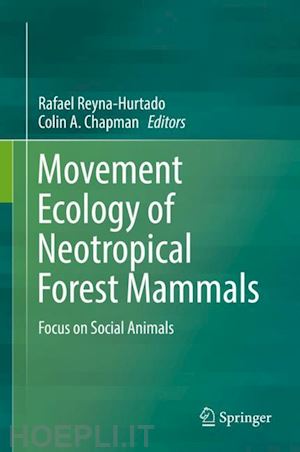
Questo prodotto usufruisce delle SPEDIZIONI GRATIS
selezionando l'opzione Corriere Veloce in fase di ordine.
Pagabile anche con Carta della cultura giovani e del merito, 18App Bonus Cultura e Carta del Docente
This book brings a unique perspective to animal movement studies because all cases came from tropical environments where the great diversity, either biological and structurally (trees, shrubs, vines, epiphytes), presents the animal with several options to fulfill its live requirements. These conditions have forced the evolution of unique movement patterns and ecological strategies. Movement is an essential process in the life of all organisms. Animals move because they are hungry, thirsty, to avoid being eaten, or because they want to find mates. Understanding the causes and consequences of animal movement is not an easy task for behavioural ecologists. Many animals are shy, move in secretive ways and are very sensible to human presence, therefore, studying the movements of mammals in tropical environments present logistical and methodological challenges that have recently started to be solved by ecologist around the world. In this book we are compiling a set of extraordinary cases where researchers have used some of the modern technology and the strongest methodological approaches to understand movement patterns in wild tropical mammals. We hope this book will inspire and encourage young researchers to investigate wild mammal´s movements in some of the amazing tropical environments of the world.
Rafael Reyna-Hurtado is a Mexican biologist that has studied tropical ungulates since 1997 in Mesoamerica and Uganda. Rafael obtained a Master degree and PhD degree in Wildlife Ecology and Conservation in University of Florida. He also conducted a three years postdoctoral study in McGill University, Montreal, Canada with focus in Africa terrestrial mammals. Rafael has published more than 60 articles among scientific papers, book chapters and public contributions. Rafael has focused on the study of the movement ecology of a social species, the white-lipped peccary in the Calakmul forest of Mexico. Rafael is a professor of El Colegio de la Frontera Sur in Campeche city, Southern Mexico where he has formed a team of highly qualified students that are conducting studies in movement patterns of tropical ungulates in all Mesoamerica.
Colin A. Chapman is a professor of Department of Anthropology of McGill University who has published more than 400 scientific papers and has extensively studied primates socio-ecological relationship. Colin has experiences in Costa Rica, Mexico but has focused the last 29 years to studied primates communities of Kibale National Park in Uganda in one of the longest studies in primates ever conducted.











Il sito utilizza cookie ed altri strumenti di tracciamento che raccolgono informazioni dal dispositivo dell’utente. Oltre ai cookie tecnici ed analitici aggregati, strettamente necessari per il funzionamento di questo sito web, previo consenso dell’utente possono essere installati cookie di profilazione e marketing e cookie dei social media. Cliccando su “Accetto tutti i cookie” saranno attivate tutte le categorie di cookie. Per accettare solo deterninate categorie di cookie, cliccare invece su “Impostazioni cookie”. Chiudendo il banner o continuando a navigare saranno installati solo cookie tecnici. Per maggiori dettagli, consultare la Cookie Policy.